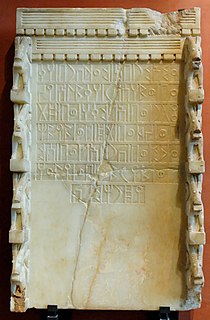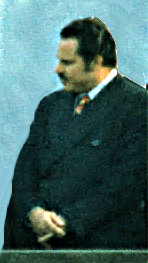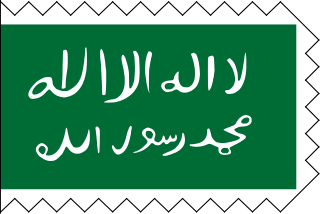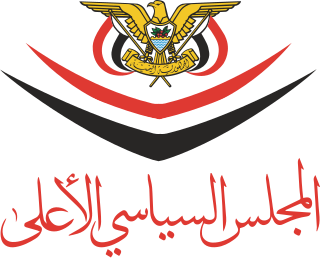Related Research Articles

The history of Yemen describes the cultures, events, and peoples of what is one of the oldest centers of civilization in the Near East. Its relatively fertile land and adequate rainfall in a moister climate helped sustain a stable population, a feature recognized by the ancient Greek geographer Ptolemy, who described Yemen as Eudaimon Arabia meaning "fortunate Arabia" or "Happy Arabia". Yemenis had developed the South Arabian alphabet by the 12th to 8th centuries BCE, which explains why most historians date all of the ancient Yemeni kingdoms to that era.

The Hejaz is a region in the west of Saudi Arabia. The name of the region is derived from a verb ḥajaza (حَجَز), from the Arabic root ḥ-j-z (ح-ج-ز), meaning "to separate," and it is so called as it separates the land of the Najd in the east from the land of Tihāmah in the west. It is also known as the "Western Province." It is bordered in the west by the Red Sea, in the north by Jordan, in the east by the Najd, and in the south by the 'Asir Region. Its largest city is Jeddah, the second largest city in Saudi Arabia, with Mecca and Medina being the fourth and fifth largest cities respectively in the country.

Al-Bahah Province is a province of Saudi Arabia. It is located in the southwestern part of the Hejazi region. It has an area of 9,921 km², and a population of 476,172 (2017). Its capital is Al Bahah. The region includes Al-Baḥah City, Al-Mikhwah and Baljorashi. Baljorashi has a famous traditional market known as sooqe as-sabt, which translates to English as "Saturday market". The Baljorashi market is very old and its exact age is unknown. This market opens after the Fajr prayer, or around 5 A.M. local time. The market closes around noon. People come from all over the region to buy and sell handmade goods. Other cities in the region include Baljourashi, Al-Mikhwah, Rahwat Albar, Sabt Alalaya, and a city by the Red Sea called Al-Qunfunda. Al-Baḥah region is the home of two Azd tribes, the Ghamid and the Zahran.

Jazan Region also spelled Jizan is the second smallest region of Saudi Arabia. It stretches 300 km (190 mi) along the southern Red Sea coast, just north of Yemen. It covers an area of 11,671 km2 and has a population of 1,567,547 at the 2017 census. The region has the highest population density in the Kingdom. The capital is the city of Jizan; Prince Muhammad bin Nasser has been the Governor since April 2001.

Ali Nasir Muhammad Husani is the former leader of South Yemen serving as General Secretary of the Yemeni Socialist Party between 1980 and 1986. He was twice president of South Yemen and once the Prime Minister. He served as the Prime Minister from 2 August 1971 until 14 February 1985 and as Chairman of the Presidential Council from 26 June 1978 - 27 December 1978. In April 1980, South Yemeni president Abdul Fattah Ismail resigned and moved to Moscow. His successor was Ali Nasir Muhammad who took a less interventionist stance toward both North Yemen and neighbouring Oman. On January 13, 1986, a violent struggle began in Aden between Ali Nasir's supporters and supporters of the returned Ismail. Fighting lasted for more than a month and resulted in thousands of casualties, Ali Nasir's ouster, and Ismail's death. Muhammad's term had lasted from 21 April 1980 to 24 January 1986. Some 60,000 people, including the deposed Ali Nasir, fled to North Yemen. He was succeeded by Haidar Abu Bakr al-Attas.

A kasbah, or variant spelling casbah or qasbah in English, also known as qasaba, gasaba and quasabeh, in India qassabah, in Portuguese alcáçova, and in Spain alcazaba, is a type of medina or fortress (citadel). The meaning of the word kasbah is varied, including "keep", "old city" and "watchtower" or "blockhouse".

Lahij is a governorate of Yemen.

Al Bahah is a city in the west of Saudi Arabia in the Hejaz area. It is the capital of Al Bahah Region, and is one of the Kingdom's prime tourist attractions. It enjoys a pleasant climate and is surrounded by more than forty forests, including Raghdan, al Zaraeb and Baidan. Al Baha is the headquarters of the Governor, local councils and branches of governmental departments. Receiving the state's special attention, the city of Al Baha abounds in educational, tourist and health institutions. It is considered the capital of the Ghamdi and Zahrani tribes in Saudi Arabia, and most of its inhabitants are from the native tribes.

The Idrisiyya was a Sufi order founded by Ahmad Ibn Idris al-Fasi (1760–1837). It was originally called the Tariqa Muhammadiyya. This was not a Tariqa in the sense of an organized Sufi order, but rather a spiritual method, consisting of a set of teachings and litanies, aimed at nurturing the spiritual link between the disciple and Muhammad directly.

The Idrisid Emirate of Asir was a state located in the Arabian Peninsula. The Emirate was located in the geographical region of Asir and Jizan in what is now southwestern Saudi Arabia.
Wajdi al-Ahdal is a Yemeni novelist, short story writer and playwright. Laureate of the International Prize for Arabic Fiction (IPAF) in 2008, is known for his contemporary literary style and sometimes socially critical works, some of which have been censored in Yemen. Until 2019, he has published five novels, four collections of short stories, a play and a film screenplay.
Muhammad al-Gharbi Amran is a Yemeni short story writer, novelist and politician. He is known for his short stories and for his controversial novel Mushaf Ahmar. He is also a former deputy mayor of Sanaa.
Yasir Abdel Baqi is a Yemeni novelist, screenwriter, journalist and author. He was born in Aden and studied history and antiquities at university. His first book of short stories was called Ahlam (Dreams) followed by a collection called Night Woman. His controversial novel Zahavar appeared in 2008.
Muhammad Abdallah Muthanna is a Yemeni novelist, playwright and short story writer. He was born in Hudaida and was educated in Cairo. In the 1970s, he was jailed several times by the authorities for his activities as a political dissident. He has worked in journalism as well as in government. He is a prolific writer of fiction and drama and is well known for his short stories, which have been translated into English and Italian. His first collection of stories, entitled Fi giawf al-layl, came out in 1976. Subsequent collections include Al-jabal yabtasim aydan (1978) and Rihlat al-umr (2002). In 1990, he won an Arabic short story award presented in Alexandria, Egypt.

Khaled Mahfoudh Bahah is a Yemeni politician and diplomat who served as Prime Minister of Yemen between 2014 and 2016, as well as Vice President of Yemen from 2015 until he was sacked on April 3, 2016 by President of Yemen Abdrabbuh Mansur Hadi.

The South Yemeni Civil War, colloquially referred to as The Events of '86 or The Events of January 13, or more simply as The Events, was a failed coup d'etat and armed conflict which took place on January 13, 1986 in South Yemen. The civil war developed as a result of ideological differences, and later tribal tensions, between two factions of the ruling Yemeni Socialist Party (YSP), centred on Abdul Fattah Ismail's faction, al-Toghmah, and Ali Nasir Muhammad's faction, al-Zomrah, for the leadership of the YSP and the PDRY. The conflict quickly escalated into a costly civil war that lasted eleven days and resulted in thousands of casualties. Additionally, the conflict resulted in the demise of much of the Yemeni Socialist Party's most experienced socialist leadership cadre, contributing to a much weaker government and the country's eventual unification with North Yemen in 1990.
Muhammad Musa al-Amri is a Yemeni politician. He is the leader of al-Rachad party in Yemen, and he was appointed as Minister of State on 7 November 2014 as part of Khaled Bahah's cabinet. He remained in office even after the 2014 coup carried out by the Houthis that led Bahah's government to resign on 22 January 2015.
The Wadi Turabah Nature Reserve is a protected area in the Makkah Region of southwestern Saudi Arabia. It is situated about 150 km (93 mi) south-east of Ta'if and 80 km (50 mi) north of al Bahah, sandwiched between the road between Taif and al Bahah and the road running along the escarpment between Banu Sa'ad and al Bahah. It adjoins the Jabal Ibrahim/Wadi Buwwah Protected Area, Jabal Ibrahim being a granite mountain rising about 1,000 m (3,300 ft) above the surrounding rocky hills. Wadi Turabah and Jabal Ibrahim have a total area of around 42,000 hectares and the elevation rises from 1,600 m (5,249 ft) to 2,604 m (8,543 ft) at the summit of Jabal Ibrahim.
Nayef al-Bakri is a Yemeni politician who serves as minister of youth and sports in the cabinet of Prime Minister Khaled Bahah. He was appointed in mid-September 2015, succeeding Rafat Al Akhali.

The Supreme Political Council is an unrecognised executive body formed by the Houthi movement and the General People's Congress (GPC) to rule Yemen. Formed on 28 July 2016, the presidential council consists of 10 members and was headed by Saleh Ali al-Sammad as president until his death from a drone air strike on 19 April 2018 with Qassem Labozah as vice-president. Its territory that it rules consists of the former North Yemen, which united with South Yemen in 1990.
References
| | This article about a Yemeni writer or poet is a stub. You can help Wikipedia by expanding it. |